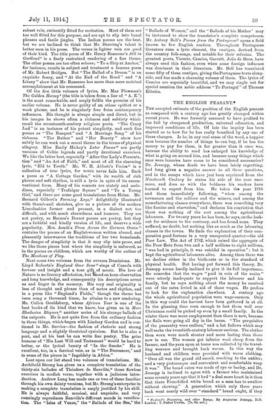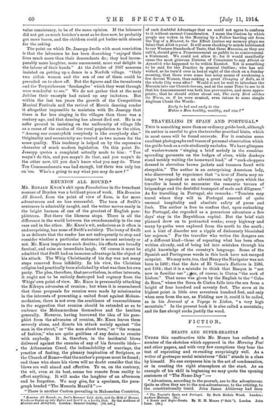THE ENGLISH PEASANT.*
THE accepted estimate of the position of the English peasant as compared with a century ago has greatly changed within recent years. He was formerly assumed to have profited to the full by cheapened production, universal education, and improved conditions of life. Of late the inquiry has been started as to how far he has really benefited by any one of these changes. Is he, in any real sense of the word, a happier man because the number of things he can buy, if he has the money to pay for them, is far greater than it once was, because the ability to read has enlarged his knowledge of what is going on around him, and because many things which once were luxuries have come to be considered necessaries ? Dr. Jessopp, whose death we have been lately regretting, had long given a negative answer to all these questions, and in the essays which have just been reprinted from the Nineteenth Century he states his side of the case once more, and does so with the boldness his readers have learned to expect from him. He takes the year 1816 and those immediately following, " when among the townsmen and the colliers and the miners, and among the manufacturing classes everywhere, there was something very like famine and starvation," and declares his conviction that there was nothing of the sort among the agricultural labourers. For twenty years he has been, he says, on the look- out for evidence to the contrary, and has found none. They suffered, no doubt, but nothing like as much as the labouring classes in the towns. He finds the explanation of their com- parative good fortune in a very unexpected quarter—the old Poor Law. The Act of 1782, which raised the aggregate of the Poor Rate from two and a half millions to eight millions, " was bad in principle, it was suicidal in operation" ; but it kept the agricultural labourers alive. Among them there was no decline either in the birth-rate or in the standard of physical health. But having put forward this theory, Dr. Jessopp seems hardly inclined to give it its full importance. He concedes that the wages " paid in coin of the realm " were - utterly inadequate to support the labourer and his family, but he says nothing about the money he received out of the rates levied in aid of those wages. He prefers to look for the explanation elsewhere. A century ago the whole agricultural population were wage-earners. Only in this way could the harvest have been gathered in at all. In the gleaning time corn enough to last them well over Christmas could be picked up even by a small family. In the winter there was more employment than there is now, because the flails were going all day in the barns. "The perquisites of the peasantry were endless," and a list follows which may well make the twentieth-century labourer envious. The clothes then worn were much stouter and more lasting than those now in use. The women got inferior wool Cheap from the farmer, and the yarn spun at home was collected by the travel- ling weavers and brought back woven. In this way the husband and children were provided with warm clothing. " Over all was the grand old smock, reaching to the ankles; and a very picturesque and convenient and comfortable wrap it was." The bread eaten was made of rye or barley, and Dr. Jessopp is inclined to agree with a farmer who maintained some seventy years ago that it had" a deal more heart in it than that there Frenchified white bread as a man has to swallow without chewing." A generation which only three years tack went nearly wild over "atandard " bread ought, if they • 'England's Peasantry, and other Ramis. By Augustus dessopp„ D.D. London : T. FishOr'Unwtn. IN. 6d. net]
value consistency, to be of the same opinion. If .the labourer did not get as much butcher's meat as he does now, he probably got more bacon, and the children could get butter-milk almost for the asking.
The point on which Dr. Jessopp dwells with most conviction is that the labourers he has been describing "enjoyed their lives much more than their descendants do ; they had incom- parably more laughter, more amusement, more real delight in the labour of their hands." At the Jubilee of 1887 someone insisted on getting up a dance in a Norfolk village. "Only two oldish women and the son of one of them could be prevailed on to show off. But the figures and the turnabouts and the Terpsichorean fandangles ' which they went through were wonderful to see." We do not gather that at the next Jubilee their example had raised up any imitators. But within the last ten years the growth of the Competition Musical Festivals and the revival of Morris dancing render it altogether impossible to maintain with Dr. Jessopp that there is far less singing in the villages than there was a century ago, and that dancing has almost died out. He is on safer ground in insisting on the uniformity of village life as a cause of the exodus of the rural population to the cities. -" Among our countryfolk everybody is like everybody else." Originality and eccentricity are treated as two names for the same quality. This tendency is helped on by the repressive character of much modern legislation. On this point Dr. Jessopp quotes a complaint actually made to him : " You mayn't do this, and you mayn't do that, and you mayn't do the other now, till you don't know what you may do. Them Ten Commandments was bad enough, but there was only ten on 'em. Who's a going to say what you may do now ? "







































 Previous page
Previous page